| We like to walk on the
sunny side of the street. It's safer and warmer.
But, on the shady side there exists as much of our neighborhood as the
sunny side, only it has less traffic. If we don't look
across the street to the shady side, we are vulnerable to its demons,
for the dark side of our neighborhoods are as alive and eager for
recognition as our sunny sides. Such is the case with
Fear, Intimidation and Complacency. This Triad of Terrorism
paves the shady sides of our mind's neighborhood. Courage,
Conviction and Complacency paves the bright side. Find out
how and why we should cross the street and visit our dark side and
become allies with it before it visits us in the form of unexpected
Terror. |
 VigilanceVoice VigilanceVoice

www.VigilanceVoice.com
Thursday--January
23, 2003—Ground Zero Plus 498
___________________________________________________________
If You Don't Visit A Bad Neighborhood, It Will Visit You!
___________________________________________________________
by
Cliff McKenzie
Editor, New York City Combat Correspondent News
|
GROUND ZERO, New York City, Jan. 23--The
expression, "If you don't visit a bad neighborhood, it will visit
you," is being used by the Secretary of Defense as an example of why
we should act swiftly in Iraq, and by opinion columnists as a warning
that if we hug one side of the street and turn our backs to the other,
we'll get blindsided.
 |
|
Al Qaeda's
"bad neighborhood" terrorized America |
It's easy
to ignore the bad neighborhoods in life. We drive around them.
We don't go shopping in the heart of them. And, we don't take
Sunday walks through them.
For the most part, the farther we
distance ourselves from the "bad neighborhoods" the better and safer
we feel. But with today's globalization, bad neighborhoods have
a way of visiting us weather we like it or not. It is also the
reason we need to all walk through them so we don't get blindsided.
On September 11, 2001, the bad neighborhood
of Al Qaeda came for a short visit, leaving millions of pounds of
debris and destruction, and sweeping away nearly 3,000 lives.
A few months ago in the suburbs around Washington D.C. a couple of
snipers came to visit from bad neighborhoods, taking 13 lives with
them. And now, as we sit on the brink of war in Iraq, and
face a showdown with North Korea for another possible war, we're faced
with a couple of other visitors from bad neighborhoods.
The problem we face isn't the
presence of Terrorism, it is our Complacency to understand where
it comes from and how to counter it.
We would rather cover our eyes and
pretend Terrorism will go away. But it isn't going to.
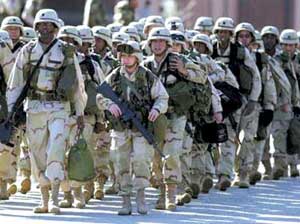 |
|
US troops on
their way to the Iraqi neighborhoods |
Not many Americans want to think of 150,000 American troops massed in
and around Iraq, poised to strike at Baghdad around mid-February, or,
that the cost of keeping them on the ready is $1 billion a week.
We would rather think about who is going to win the Super Bowl, or who
will be the grand winner at the Academy Awards, or maybe wonder if
Tony Soprano will have an affair with his psychiatrist before the show
ends.
We have lots of places to look
rather than at our global or domestic backyards, littered with things
we would rather not see.
No one really wants to think of
American boys splayed out on a battlefield, their bodies bloated by
some deadly gas they were exposed to. No one wants to
think of France and Germany turning their backs on the U.S. and
denying them support in an attack against Iraq, or to think that our
European allies aren't really allies at all in a pinch.
Of course, there is
little interest in wanting to take the madman of Kim Jong Il's ilk on,
a guy who has threatened to launch Korean War II if his nuclear
production plants are attacked. We don't want to "go
there" and dwell on what might happen "if..."
Straddling the fence is
easier. Ignorance is bliss.
 |
|
Ignorance is
not always bliss |
It is
much easier to abdicate the responsibility for the global security of
the world to guys like Donald Rumsfeld, the Secretary of State who is
masterminding the war in Iraq. The recent cover story on
him in Time Magazine positions him as the "civilian general"
directing the military on how to fight to the war in minute detail.
No one is wondering why a civilian has garnered so much power over the
military, or, if he is qualified to prove his skill in commanding.
No one is wondering why the general who led the victory in the Gulf
War, Norman Schwarzkopf, hasn't been asked back to command the Iraq
invasion, or why he wasn't asked to find Osama bin Laden in the first
place.
Those are bad
neighborhoods. They require us to confront issues.
And, to confront issues, one must be informed on the issues he or she
is confronting. That means lots of work. It
means we must research and study them, and then form opinions based on
the multitude of facts.
It's much easier to just
turn our backs and let others do the juggling of the hot potatoes.
After all, why should we,
the "average citizen" try and figure things out as complicated as
global Terrorism? Isn't that what we pay the politicians and
generals for?
Nothing is more
Complacent than this kind of thinking, but it permeates our society.
Even if our small
Voices can't or won't be heard by those who lock themselves in the
castles of political and military might, there are ears that can hear
what we say who are far more influential in the world of public
opinion than the President of the United States, the Secretary of
State, or the leader of the United Nations.
Those most valuable
ears are the ones of our children, our grandchildren, our loved
ones--the little ones.
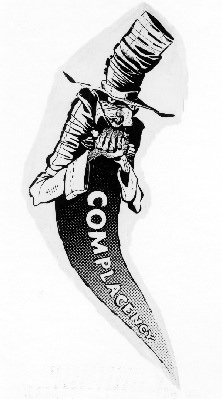 |
Public Complacency is fertilized by parents to children, generation
upon generation. On the obverse, public Action is
fertilized by parents to children, generation upon generation.
In the "bad
neighborhoods," all the parents talk about is the "oppressors."
They teach their children through anger and hostility to "hate" and
"resent" and "hold liable" those who oppress them, or threaten them
with continued oppression.
The Terrorists who
flew their planes into the World Trade Center were trained to be
Terrorists not by Osama bin Laden or Saddam Hussein, but by their
parents and grandparents and their loved ones who extolled the vile
and corrupt nature of the "good neighborhoods" who stole from the "bad
neighborhoods" and why the "good neighborhoods" should be punished for
their violations of the "bad neighborhoods."
The snipers who shot
people at will in the Washington D.C. area a few months ago were
brought up with menu of hating the "haves," and as "have nots," felt
they had the right to revenge their station, to revolt against the
"good neighborhoods."
If we look at the
ills of the world, the core of the problem is usually between the bad
versus good neighborhoods. North Korea is definitely a "bad
neighborhood." Its famine and economic crisis, plus its
famine and the fact the government spends 50 percent of its revenues
on its military forces, creates a hungry Beast of Terror arming itself
to "take what it wants" from those who "have."
I have a very
wealthy friend who came up from the streets. He had nothing and
learned to get things by hook and crook. Not that he was
criminal, but his tactics were raw and edgy. If there was a
scrap on the table, he'd grab it before anyone else. As he
amassed his fortunes he purchased numerous weapons, machine guns,
rifles, pistols and buried them around his mansion in protective
cloths.
If there ever was a
revolution, he said, he had no worries. While most people
might hoard food and make bomb shelters in case of a crisis, he
hoarded weapons. His philosophy was with the weapons he
could take all the food from all the people who hoarded it, and all
their money. He didn't have to hoard anything but
violence, for in the end, the takers would win, he said.
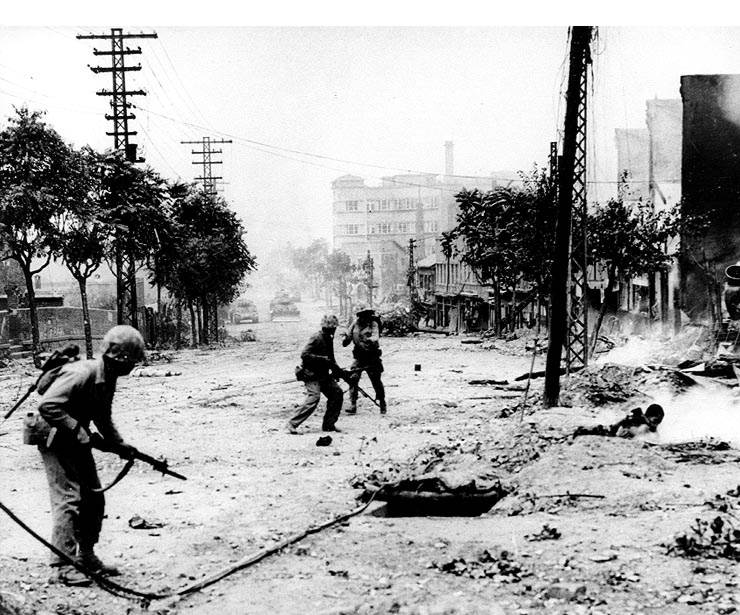
|
|
"Bad
neighborhood" = Battle for Seoul |
Instilled in his nature
was the "bad neighborhood." He had grown up in a tough
street culture where power meant everything, and violence was the
ultimate source of reaping rewards otherwise not available.
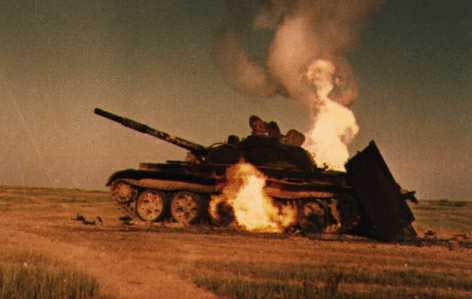 |
|
Iraqi battle
in "bad neighborhood" |
North Korea and Iraq
are examples of the bullies of bad neighborhoods. They are
the kids on the street who don't have things and want what others
have, but rather than earn them in a fair play, prefer to take them
under threat or coercion.
Currently, public
opinion in the United States is slipping regarding the war against
Iraq. That latest CNN/Post poll shows that 54 percent of the
American public are worried that the U.S. will move too quickly
against Iraq, and suggest we should follow the France/German "give
them time to comply" approach. Overall support on military
action against Iraq is also slipping. In December, 62
percent of the nation was in favor of military action. Today, it
has dropped to 57 percent and appears to be sliding down each day.
No one really wants
to go into the "bad neighborhood." No one wants to face
it.
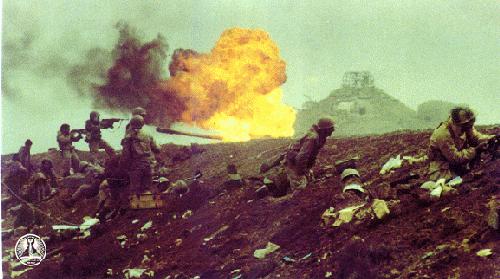 |
|
The 'bad
neighborhood" of war in Iraq |
But our Complacency that is growing daily is symbolic of our lack of
knowledge about what bad neighborhoods are all about. They
breed future Terrorists.
The children
in the bad neighborhoods are being fed constant information about how
America and other nations who have the things they don't are keeping
them and their families in states of poverty. That won't
change until the regimes change.
The young
Terrorists will continually be shaped by the suffering they endure,
and the beliefs they are spoon-fed by their parents.
Our
young Complacent children will also be shaped by the lack of knowledge
of the bad neighborhoods they avoid. As we guard and
protect our children from the reality of the "bad neighborhoods," we
instill in them the gap between the haves and have-nots. We make
it seem they have a right to what they have by default--our fault that
we don't explain to them the difference between the two neighborhoods.
We avoid such description because we don't understand those
neighborhoods. We don't understand why others hate us, or why a
parent in another culture would tell their children why America is
bad, or deserving of punishment.
If we are to
combat Terrorism, we must walk in its shoes. We must
understand its complications and teach our children what, how and why
the Beast of Terror is what it is.
A child needs
to understand prejudice, bigotry, class distinction, religions
righteousness and historical oppression in his or her own terms.
Our children
take to heart our comments. If we make sweeping statements about
a nation or a people or a race within earshot of our children, it
impacts their opinions and attitudes. They begin to form
in their minds what we say, and if we are putting down a culture or a
race or a nation or a people, they put them down too.
Worse
yet, if we are Complacent, and know nothing of the other cultures or
their attitudes and outlooks, if we aren't aware of the cultures we
are being Terrorized by, we leave our children naked, vulnerable to
thinking only from their limited viewpoints about the world.
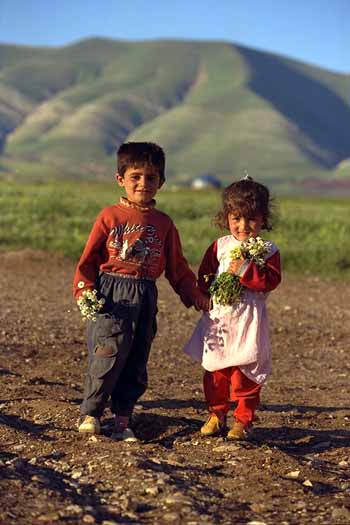 |
|
Help our
children be aware of "good neighborhoods" in Iraq |
That's why we must visit the "bad neighborhoods" with our children.
We need to walk them through the lands of Iraq and North Korea, and
show them the cultures that threaten us and the world.
When a child sees the nature of a bad neighborhood, he or she begins
to respect the "good neighborhood" more than ever.
Complacency evaporates with knowledge and understanding.
As Parents of Vigilance, we have a choice to raise our children in a
state of Complacency where they are oblivious of the world of bad and
good neighborhoods, or, to teach them the difference between the two.
In a
bad neighborhood, the Beast of Terror rules. He stalks the
neighborhood with Fear, Intimidation and Complacency. In a good
neighborhood, the Sentinels of Vigilance rule, and they march
throughout the neighborhood with their Shields and Swords of Vigilance
at the ready, issuing out Courage, Conviction and Right Actions.
In the bad
neighborhoods, the children are taught to "take" what is theirs from
those who have "stolen" their rights, or "threaten" their rights.
In good
neighborhoods, the children are encouraged to give rather than take,
and to protect the children and the children's children's children.
But this
understanding only comes from parents and guardians who have walked in
the shoes of those in the bad neighborhoods. It requires them to
read, understand, and talk to others who have a variety of opinions,
and then form their own from all the data.
It also
requires that a parent subscribe to the Pledge of Vigilance, so that
he or she understands that Terrorism is the absence of Vigilance, that
Terrorism is only about looking at one side of the coin, and ignoring
the other. That Terrorism is not about doing what is right
for the Children's Children's Children's, for if it were about that,
Terrorists would never employ Fear, Intimidation and Complacency as
tools of war.

|
|
Teach our
children both sides of an issue: understanding the difference
between good and bad neighborhoods |
Parents of Vigilance need to face their own Fear, Intimidation
and Complacency, and be willing to so that they can appreciate
the Courage, Conviction and Right Actions that comprise
the "good neighborhood" of Vigilant Thought.
Then they can pass these Vigilant Viewpoints on to their
children, loved ones. They can build a great
defense against Terrorism's greatest ally--Complacency.
Today, a Child of Terrorism is being trained today to
be an adult of Terrorism. It is happening
this second. To counter that, we need to mold
Children of Vigilance. We can't do that by ignoring
the bad neighborhoods.
Teaching a child the Virtues of Vigilance prepares a child
to battle Terrorism. The more children who
understand the difference between the good and bad neighborhoods,
the more chances all the children will want to play in
the safety and security of the Vigilant World.
Take a walk through a bad neighborhood, but carry with
you the Pledge of Vigilance. It will keep
you safe.

Jan.
22 -- Aborting The Beast of Terror
©2001
- 2004, VigilanceVoice.com, All rights reserved -
a ((HYYPE))
design

|
|
|